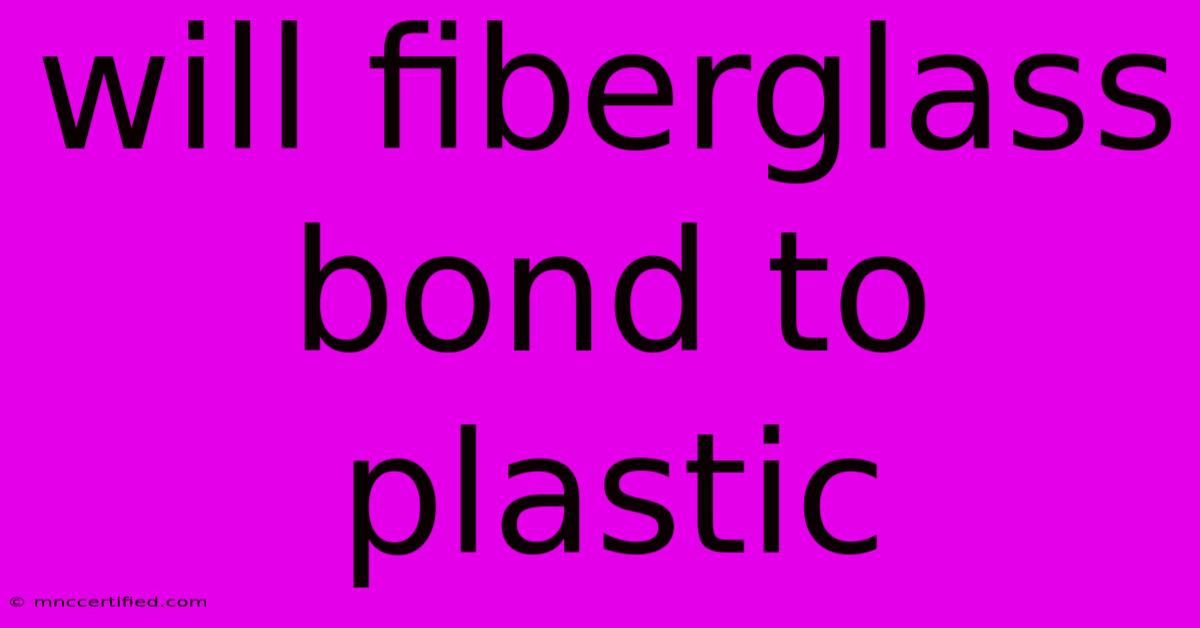Will Fiberglass Bond To Plastic

Table of Contents
Will Fiberglass Bond to Plastic? A Comprehensive Guide
The question of whether fiberglass will bond to plastic is a common one, especially for DIY enthusiasts and professionals working with composites. The answer, unfortunately, isn't a simple yes or no. The success of bonding fiberglass to plastic depends heavily on several factors, including the type of plastic, the type of fiberglass, and the adhesive used. Let's delve deeper into these crucial elements.
Understanding the Challenges of Fiberglass and Plastic Bonding
Fiberglass, a strong and versatile material, is known for its excellent tensile strength and resistance to many chemicals. However, its smooth, non-porous surface can present challenges when bonding to other materials, especially plastics. Plastics, themselves, come in a vast array of types, each with its unique chemical composition and surface properties. Some plastics are highly porous and readily accept adhesives, while others are smooth, non-porous, and chemically resistant, making bonding difficult.
The key challenge lies in achieving adequate surface adhesion. Most adhesives require a certain degree of surface energy to create a strong bond. Smooth, low-energy surfaces like some plastics often repel adhesives, leading to weak or failed bonds.
Factors Influencing Bond Strength
Several key factors determine the success of bonding fiberglass to plastic:
-
Type of Plastic: Thermoplastics (like ABS, polypropylene, and polyethylene) are generally more challenging to bond to than thermosets (like polyester or epoxy resins). Thermoplastics can be more flexible and have lower surface energy, making it difficult for adhesives to grip effectively. Each thermoplastic has its own unique characteristics that influence bondability. For instance, polypropylene is notoriously difficult to bond to compared to ABS plastic.
-
Type of Fiberglass: The type of fiberglass (e.g., woven roving, mat, cloth) doesn't significantly affect the bond to the plastic itself, but the resin used to create the fiberglass component is crucial. The resin's compatibility with the chosen adhesive plays a significant role in the bond strength.
-
Surface Preparation: This is arguably the most critical factor. Proper surface preparation is essential for a strong bond, regardless of the materials involved. This typically involves:
- Cleaning: Removing any dirt, grease, oil, or other contaminants from both the fiberglass and plastic surfaces using a suitable solvent.
- Roughening: Increasing the surface area for better mechanical interlocking. This can be achieved through sanding, abrading, or using a chemical etching process. The choice of technique depends on the type of plastic. Aggressive sanding might damage softer plastics.
-
Choice of Adhesive: Selecting the right adhesive is paramount. Not all adhesives work equally well with all combinations of fiberglass and plastic. Consider adhesives specifically designed for plastics and composites, such as epoxy resins, polyurethane adhesives, or cyanoacrylate (super glue) – but always check compatibility with your chosen plastic type. Two-part epoxy resins usually provide the strongest and most durable bonds.
-
Application Technique: The correct application method ensures proper adhesive distribution and contact between the surfaces. Applying consistent pressure after bonding further enhances the bond's strength.
Improving the Chances of Successful Bonding
To increase the likelihood of a successful bond, consider these strategies:
- Primer: Using a primer specifically formulated for your plastic type can significantly enhance surface adhesion. The primer promotes better wetting of the plastic surface by the adhesive.
- Mechanical Fasteners: Supplementing the adhesive bond with mechanical fasteners (screws, rivets, or clamps) provides additional strength and security, especially for high-stress applications.
Conclusion: It's Possible, But Requires Careful Consideration
While bonding fiberglass to plastic is achievable, it demands meticulous attention to detail. Choosing the appropriate adhesive, carefully preparing the surfaces, and potentially using mechanical fasteners are all crucial for a successful and durable bond. Understanding the specific properties of your plastic and fiberglass materials is paramount to selecting the right approach and maximizing your chances of success. Always conduct thorough testing and consider consulting with a materials specialist for particularly challenging projects. Remember to always prioritize safety and wear appropriate protective equipment when working with adhesives and solvents.

Thank you for visiting our website wich cover about Will Fiberglass Bond To Plastic. We hope the information provided has been useful to you. Feel free to contact us if you have any questions or need further assistance. See you next time and dont miss to bookmark.
Featured Posts
-
Bondis Role In Trumps 2020 Claims
Nov 22, 2024
-
Tottenham Teen Faces Dubai Jail Term
Nov 22, 2024
-
Alex Burghart Kemi Badenoch Pmqs Update
Nov 22, 2024
-
Rooney Scandals Coleens I M A Celeb Take
Nov 22, 2024
-
The Palace Coral Gables On Uk Tv
Nov 22, 2024